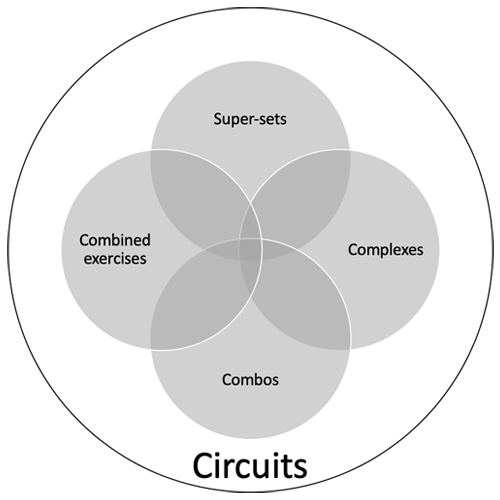Circuits, Combos, and Complexes – Part 1
Introduction
Circuits represent a method of exercise organization, in which multiple exercises are performed one after another with little or no rest in-between. Exercises can be compound, isolated, ballistic, and involve only upper or lower body exercises or combinations (Table 1).
| Upper Body | Lower Body | Total Body | Ballistic |
|---|---|---|---|
| Push-Ups x10 | Goblet Squat x10 | Back Squat x10 | Step-up Jump x5 |
| Pull-Ups x5 | SLRDL x10 | Bench Press x10 | Explosive MB Throw x5 |
| DB Press x10 | Lateral Split Squat x10 | SLRDL x10 | KB Swing with band x10 |
| Inverted Row x10 | Glute Bridges x10 | Inverted Row x10 | Rotational MB Throw x5 |
| High/Vertical Pulls x10 | Step-Ups x10 | Step-up x10 | |
| Delt flys x10 | Calves Rises x10 | DB Press x10 | |
| Reverse delt flys x10 | Sumo deadlift x10 | Hip Thrust x10 | |
| Pull-ups x10 | |||
| Abs Roll-out x10 |
Table 1: Example of Upper Body, Lower Body, Total Body, and Ballistic Circuits
When working with strength-generalists, I am leaning towards organizing strength training sessions using mini-circuits (or mini-block; or should I call them organizational circuits?), and I am especially fond of using the explosive circuit for combat athletes (Table 2). The explosive circuit is a quality circuit with ample rest time between ballistic exercises. This rest time can be created by adding fillers or by alternating upper vs. lower body explosive movements. This type of organization is very modular and it also allows for organizing the gym flow when working with large(er) groups under equipment constraints. For example, athletes can share the main movements, but the fillers can be done individually depending on a specific need to address a problematic region that the athlete has.
| Block | Exercise |
|---|---|
| Warm-Up | Foam Roll |
| Ground Mobility | |
| Plate Complex | |
| Explosive Block | A1. Step-Up Jump |
| A2. Kneeling MB Throw | |
| A3. KB Swing w/band | |
| A4. Rotational MB Throw | |
| Strength Block I | B1. Hex bar deadlift |
| B2. Hip stretch (filler) | |
| B3. Ring push-ups | |
| B4. External shoulder rotation (filler) | |
| Strength Block II | C1. Pull-Ups |
| C2. Neck isoHold (filler) | |
| C3. Speed skater | |
| C4. Calves (filler) | |
| Endurance Block | D1. Battle Ropes 15sec |
| D2. Bike 15sec | |
| D3. Ski erg 15sec | |
| D4. Sled push 15sec | |
| Work to Rest 15:15sec. Repeat 2×3 with 3min break | |
| Recovery Block | Stretch |
| Protein shake | |
| Shower |
Table 2: Session organization using mini-circuit (mini-block)
Circuits represent very broad and loose category of exercise organization. Various sub-types of circuits can be created by applying different constraints (e.g., Upper, Lower, Total, or Ballistic circuits in Table 1, or even the aforementioned organizational circuits). For example, super-sets are a special type of circuits where only two exercises are performed (please refer to the Volume One and Two of the Strength Training Manual 5) for more information about different types of super-sets). Besides super-sets, another special types of circuits are (1) complexes, (2) combos, and (3) combined exercises (Figure 1).

Figure 1: Simplistic Venn diagram of different special types of circuits
Complexes
Complexes are very constrained types of circuits in which (1) a single piece of equipment is being used (e.g., barbell, dumbbell, bodyweight, kettlebell), (2) exercises are performed in the same area or will little movement around, (3) there is no rest between exercises, (4) there is no changing of the weights or letting go of the equipment, (5) exercises are performed with the same number of repetitions, (6) all repetitions of one exercise are performed before moving to another exercise, (7) one pass through all exercises is done before a designated break.
The weight of the implement used in the complex should be under 70% of the weakest exercises 1 2 (this again depends on the objectives of the complex, as well as the number of repetitions performed; but it does represent useful rule of thumb).
Table 3 contains an example of a kettlebell complex performed with a single kettlebell.











Responses